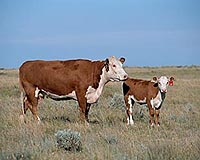 |
Paris (AFP) July 22, 2009 Another clue has been found in the Case of the Shrinking Sheep, an animal mystery in which climate change features as the principal culprit. The tale of scientific sleuthing is unfolding on two Scottish islands, Soay and Hirta, in the remote Outer Hebrides. Their sole inhabitants are wild sheep which probably arrived there with the first human settlers some 4,000 years ago. The sheep's isolation and lack of predators make them terrific candidates for studying the impact of weather, food and genetics on a wild animal population. The flock, suffering occasional surges and crashes in numbers, has been closely scrutinised since the 1950s. Two years ago, researchers came across a strange thing: The average size of the Soay sheep was progressively falling. That finding ran counter to Darwinian intuition. Evolutionary theory said that, given the cold, rough winter on the islands, bigger sheep had the better chance of survival, so their genes should progressively dominate the flock. The solution to this enigma, suggested Imperial College London scientists earlier this month, lies in global warming. Milder winters in recent decades have enabled smaller lambs, which otherwise would have died after birth, to survive into adulthood and then reproduce, they said. The climate whodunnit has now been backed by a trio of Australian experts, who have matched weather and population records with the colour of the sheep's coats. The smaller sheep that now dominate the flock are also lighter-haired ones, a link that has been proven by gene analysis. Bigger sheep tend to be darker. Why would coat colour make a difference? The answer, suggests the team led by University of Western Australia's Shane Maloney, is that, in colder times, sheep with darker coats have an advantage. Mammals with darker coats absorb more solar radiation and thus need to expend less food energy to keep warm than do their lighter counterparts. But, as the climate has warmed in the North Atlantic, this advantage has diminished, which gives more of a chance for lighter-haired (and smaller) rivals in the struggle to survive. "If environmental effects are the cause of the decline, then we can expect the proportion of dark-coloured Soay sheep to decrease further," the fleece police add soberly. The study appears on Wednesday in Biology Letters, published by the Royal Society, Britain's de-facto academy of sciences. Share This Article With Planet Earth
Related Links Farming Today - Suppliers and Technology
 Obama should push China on pork and beef: US senator
Obama should push China on pork and beef: US senatorWashington (AFP) July 21, 2009 US President Barack Obama should press visiting Chinese officials next week to open China's markets to banned US beef and pork exports, Republican Senator Charles Grassley said Tuesday. "I ask that when meeting with the visiting delegation from China next week, your administration raise the issue of China's continued barriers to exports of US pork and beef," Grassley said in a letter to ... read more |
|
| The content herein, unless otherwise known to be public domain, are Copyright 1995-2009 - SpaceDaily. AFP and UPI Wire Stories are copyright Agence France-Presse and United Press International. ESA Portal Reports are copyright European Space Agency. All NASA sourced material is public domain. Additional copyrights may apply in whole or part to other bona fide parties. Advertising does not imply endorsement,agreement or approval of any opinions, statements or information provided by SpaceDaily on any Web page published or hosted by SpaceDaily. Privacy Statement |